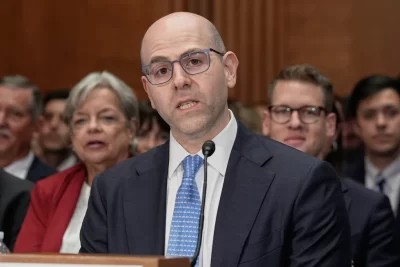
Albania qualified for just its second European Championship in style, atop a group that included the Czech Republic and Poland.
It’s a dream come true for the team’s South American coaches.
“It’s unbelievable,” Brazilian head coach Sylvinho said Wednesday. “We’ve got everything around a moment. We did a great job. Everyone, together.”
Sylvinho brought in countryman Doriva and Argentinian Pablo Zabaleta as his assistants when he was hired in January.
They formed a 24-member squad from among 60 Albanian players in Italian, Spanish, French, English leagues and beyond, not to mention local ones.
“We want to build a team that we’re able to play good football. I mean, in the way we see football,” Zabaleta said.
Albanian Prime Minister Edi Rama awarded the Golden Eagle medal to Sylvinho during a meeting of the Albanian diaspora on Wednesday.
“You are the first non-Albanian receiving the Golden Eagle not for what you have done but because you are an Albanian being born,” Rama told the Brazilian. “After the Golden Eagle very soon you should accept the Albanian citizenship too.”
Albania has made it to the European Championship only once before — in 2016 under Italian coach Giovanni de Biasi.
Sylvinho has drawn on his experiences under Pep Guardiola, whom he played for at Barcelona, and former Brazil coach Tite to create an Albanian team spirit that stresses a “complex” and “collective” game of soccer.
“Talent can win a game of football,” Zabaleta said. “But the squad, the spirit of a team, can achieve good things in football or win trophies.”
With no big names in the team, finding players to adapt to their style of play has resulted in success.
They wanted a left forward to play on the right side. That turned out to be Jasir Asani, a 28-year-old who plays for South Korean club Gwangju and who has scored some Messi-like goals.
They wanted a left back to take the ball faster to the attack and combine with the older players. It was 20-year-old Mario Mitaj of Lokomotiv Moscow who teams well with veteran Lazio winger Elseid Hysaj.
Developing Albania into a strong team for Euro 2024 and beyond remains a key goal.
“If you have to be consistent,” said Sylvinho, who had previous coaching stints with Lyon in France and Corinthians in Brazil. “You have to grow day by day, ‘avash avash’ (‘slowly slowly’ in Albanian). That’s the challenge that you have now.”
Zabaleta added: “We are not afraid of anyone. We are a good team. We have good players, and the most important thing is we need to play 100 percent every game. That’s the spirit.”
Both were reluctant to say where they saw themselves after next summer’s tournament in Germany.
“I prefer to live the unbelievable moment to dream for us and prepare the team from the next six or seven months,” Sylvinho said.
Zabaleta acknowledged that working with a national team is quieter compared to the intensity of club soccer.
“When you have a family behind you, you need to think about them,” he said, adding that he misses his wife and two young sons living in Barcelona.
They enjoy the time in Tirana, with “people (being) friendly, with Brazilian hugs, talk. Food is amazing. Amazing food. Fish,” Sylvinho said.
Sylvinho and Zabaleta hail from two of world soccer’s biggest rivals, but they are united in working together in their new roles..
“Except when Argentina plays Brazil,” Zabaleta said. “The next day he pays the dinner, he pays the lunch. But it’s incredible.”






